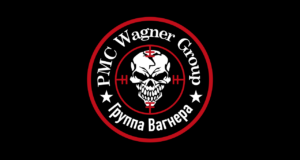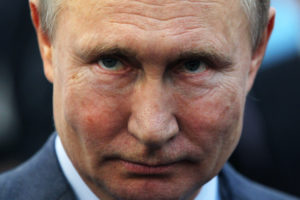Here in Odesa, the mood is a mix of incredulity, fascination and schadenfreude. Or, as my friend Hanna tells me with glee: “It’s popcorn time — it’s just a shame there’s no popcorn in Ukraine these days.” The word “Prigozhin” floats around the cafe. Phones are playing videos of Wagner tanks rolling through Russia. Hope and expectation fill the air.
Everyone is once again glued to their screens watching war. This time, though, there is a sense that this time it might be one not in their own country, but in the one next door.
Last night, an increasingly desperate or psychopathic (take your pick) Yevgeny Prigozhin, leader of the Wagner Group, did what his behaviour has long intimated he would do — and declared an all-out war on the Russian state.
It began in typically surreal fashion when, on Friday night, Prigozhin filmed another of his hysterical monologues. The set-up was as normal. He leaned forward and snarled at the camera, a Wagner flag hanging on an anonymous blank wall behind him. This time, though, instead of the usual jeremiads about military incompetence and the top brass’s victimisation of his troops, he went a step further.
Glowering at the viewer, he accused the Russian army of shelling a Wagner base. Incredibly, he claimed Russian Defence Minister Sergei Shoigu had driven to the city of Rostov in southern Russia to personally take command of the attack. Even by his standards, it was an astonishing attack on Moscow.
Over the last year, Prigozhin’s war of words with the defence establishment, notably Shoigu and Russian Commander-in-chief Valery Gerasimov, has burst into open hostility. He accused them of everything from negligence to deliberately failing to supply his troops with badly needed ammunition. But to accuse them of shelling fellow Russians fighting on the front lines? This would have been inconceivable last year.
The reaction was immediate. First, the Russian MoD publicly rejected his claims, calling them an “informational provocation”. Then, something more extraordinary happened. presidential spokesman Dmitry Peskov says Putin has been appraised and will take all “relevant steps”. Previously, Putin has stayed out of the Wagner–Military spat. Apart from anything else, to have his generals bickering is no bad thing for a dictator — Stalin did the same thing during the Second World War. First, having them at each other’s throats means they’re not trying to cut yours. And second, it can spur them into greater and more extreme action on the front as they seek to outdo each other (especially in a system where failure can carry the most severe of penalties) and thereby gain your favour.
Such latitude was given to Prigozhin — a former convict turned caterer turned oligarch — that it seemed clear that the relationship between him and Putin was a particular one. In Russia, they call it krysha, which literally means “roof”. In the late Eighties, as gangsterism grew in direct proportion to the failure of communism, and with it the implosion of the Russian state, it expanded to mean a different kind of protection; not from the elements, but from organised crime. Simply put, if you wanted to prosper, you needed a krysha — someone who would protect you — in return for a slice of the profits of course.
When gangsterism took over the Russian state, it took with it many of its practices. Putin became the top mobster in a mobster state, and, among many other things, he became Prigozhin’s krysha. This gave Prigozhin the freedom to do almost whatever he wanted, including found his own private army.
For a while it worked. Wagner sent its soldiers — generally a mix of the desperate, psychopathic and criminal — in “‘meat waves” at the enemy. It was Wagner troops who did the hard yard in Bakhmut, dying in their thousands so Putin could claim some sort of victory over the ruins that the city is today.
That, though, is over. This morning Wagner troops, accompanied by armoured vehicles including T-90S “Bhishma” tanks, rolled into the city of Rostov as Prigozhin claimed his forces were now “blockading” the city and getting ready to march on Moscow. Armed, masked men with tanks and armoured vehicles began surrounding government buildings there. The UK’s Ministry of Defence reported that Wagner units were now “moving north through Vorenezh Oblast, almost certainly aiming to get to Moscow”.
But as Wagner acted, so did the Russian state. On Telegram, the Russian Ministry of Defence sent a message to the “mercenaries of Wagner PMC”: “You have been tricked into Prigozhin’s criminal adventure and into participating in an armed rebellion… Many of your comrades from several units have already realised their mistake, [are] seeking help.”
Then more and more senior public faces joined the condemnation. One of Russia’s leading military commanders, General Sergei Surovikin, went on TV to urge Wagner mercenary fighters to “obey the will and command” of President Putin and return to their base. Meanwhile, the General Prosecutor’s Office has now launched a criminal case on “armed rebellion”.
Finally, it was the turn of Putin, who in late morning Ukraine time went on Russian TV. “Russia’s future is at stake,” he said, describing Wagner’s actions as a “stab in the back”. Without specifically mentioning Prigozhin, Putin said the high “ambitions” of some have led to “high treason”. He then warned of “inevitable punishment” for those dividing Russian society and said a counter-terrorism regime was now in place in the capital Moscow and several other regions. All “necessary orders have been given” to deal with the crisis, he concluded, at the end of a short TV address in which he made no specific mention of Wagner or Prigozhin.
Contemptuous and concise: Putin in crisis mode.
Neither man can back down. The lines are drawn and irrevocable. Putin was clear in his speech: he has ordered Russian forces to destroy Wagner. Prigozhin has seized Rostov. Heavy fighting is now reported to be ongoing in the Voronezh Region between Wagner forces and the Russian Military and National Guard. Overhead, the Russian Air Force is targeting Wagner Positions with Guided-Bombs and rockets.
This is now a civil war. Russians are killing Russians inside their own territory. How long it lasts, and how large it grows, is all yet to be determined. The odds are stacked against Prigozhin. The last coup attempt in Russia was against Boris Yeltsin on 3 October 1993 and it did not go well. The Russian army should be able to deal with him and his forces easily, but then again, they were supposed to be able to conquer Ukraine in three days.
In Ukraine, everyone, including state apparatuses, is waiting to see what will happen. For a long time, many thought that the public spat between Wagner and the Russian military was all for show; nothing more than more Russian disinformation, designed to confuse and deflect. But there is a sense that this is serious — and could be to the country’s benefit.
As the crisis continued to build, I got a text from a source in Ukrainian intelligence. “I told you it was all real,” the message read — accompanied by a smiling face emoji.
Disclaimer
Some of the posts we share are controversial and we do not necessarily agree with them in the whole extend. Sometimes we agree with the content or part of it but we do not agree with the narration or language. Nevertheless we find them somehow interesting, valuable and/or informative or we share them, because we strongly believe in freedom of speech, free press and journalism. We strongly encourage you to have a critical approach to all the content, do your own research and analysis to build your own opinion.
We would be glad to have your feedback.
Source: UnHerd Read the original article here: https://unherd.com/



